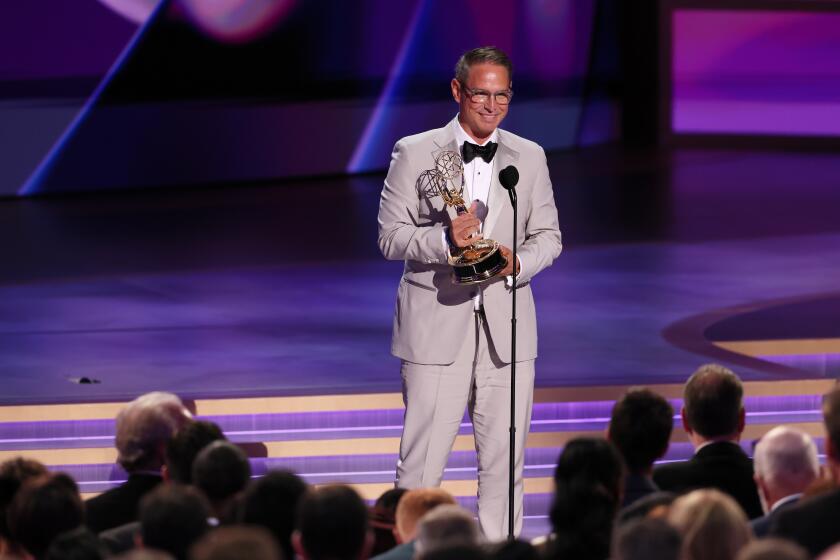It’s a Riveting Piece, and You Can Quote Me
It’s that time again.
Prime-time Emmy ballots have been mailed to members of the Academy of Television Arts & Sciences, with nominations to be announced Aug. 2 in advance of the Sept. 16 telecast on Fox.
Naturally, then, it’s also time for intense public-relations activity on behalf of the Emmy-minded. This annual lobbying frenzy inevitably features dins of horn-tooting Nominate-Us-Pretty-Please ads that loudly bellow their tunes throughout entertainment publications--known as “the trades”--like parading sousaphones.
The typical ad carries the headline “For Your Emmy Consideration” above a stack of accolades plucked from reviews. For example, a critic’s quote on “Wiseguy”: “One of the best crime dramas of the season.”
Yes, well, nothing against “Wiseguy,” but given the caliber of the genre, that’s like congratulating Grumpy for being one of the tallest of the Seven Dwarfs.
I admit I read these ads mostly to see how many times I’m quoted. Not nearly enough, I can tell you.
I also read them to sample other critics.
A gleaming Ron Powers quote from his GQ magazine review toasting William Petersen as Joseph Kennedy in “The Kennedys of Massachusetts” gives me that Boy-I-wish-I’d-written-that feeling:
“Petersen plays the adulterous, politically retrograde plutocrat with such understated, soft-voiced bloodlessness that whatever he says carries the weight of satanic verse. The very glint of his rimless glasses suggests unsheathed steel.”
There’s also much to admire in the bracing honesty of this blue-collar, roll-up-your-sleeves-and-chug-a-lug excerpt of Don Freeman from the San Diego Union: “Murphy Brown is my favorite anchorwoman and I’d sure like to have a beer with her sometime down at Phil’s Bar and Grill. We’d talk about her scoops and her travels and what she went through at Betty Ford’s clinic.”
What you see most in these ads, however, is reviewerese , the empty swill of criticspeak, that pretentious, essentially meaningless spewer that most all of us in this business upchuck in print more often than we like to admit.
A basic rule of TV reviewing: Never say “one of the season’s 10 best” more than 15 times in a season.
Another rule: Stand up for the cliches you believe in. I had an editor once who forbade using riveting --as in “riveting performance”--merely because it was trite. I changed her mind by pointing out that riveting was as crucial to a TV critic as “finely wrought,” “fully realized,” “deeply affecting” and “comment on the human condition.”
Overused, overcooked words and expressions are the petty cash we critics use to buy attention, evidenced in an Emmy ad lauding Lane Smith’s portrayal of Richard Nixon in “Final Days.” The critical raves here include “stunning,” “masterful” and “simply unforgettable.” I don’t know about that. The only unforgettable Nixon was the real one.
These quote-heavy Emmy ads that jump out at the reader are a comment on the TV critic condition:
* “Phenomenal.” As in, say, the Berlin Wall coming down?
* “Incredible.” As in the Hulk?
* “Utterly successful.” As opposed to successful minus “utterly”?
* “A fine, multilayered” performance. As in a cake?
One of my personal favorites shows up here, too: the utilitarian, absolutely indispensable, all-purpose, works-with-any-rave-review “superbly on target.” There’s no counting how many shows and performers I’ve had “superbly on target,” and, just as often, chillingly, seethingly, exquisitely, scintillatingly or uproariously “on target.”
Now we come to an Emmy ad where the superlatives really hit the fan and splatter, the subject being Nancy McKeon’s performance in “A Cry for Help: The Tracey Thurman Story.” One critic found her “powerfully moving,” another “positively brilliant.”
And get this from a critic who seems to have confused McKeon with Freddie Krueger: “She literally reaches out through the screen and clutches our heart.” Yuck.
However, someone else labeled McKeon “harrowingly vivid,” which I like so much that I’m going to use it myself, first chance I get.
Meanwhile, I turn the page and run smack into the good ol’ body parts quote: “Brings the war home with a shock that raises the hair on the back of your neck. . . .” To say nothing of your arms and legs.
Elsewhere,, a critic delivers that old standby, “a heartwarming experience.” Another describes a special “that succeeds on its own terms.” As opposed to, let’s say, your cousin Homer’s terms.
And oh yes, here it is, appearing in an ad on another page, the giant of them all, the eternally golden “triumphs of the human spirit.” It’s said that when a TV critic no longer can recognize a triumph of the human spirit, it’s time to get out of the business.
Finally here I am--and it’s about time--quoted in an ad touting Barbara Hershey’s utterly rrrrrriveting performance in “A Killing in a Small Town.”
“Bring out the Emmy,” I demand in the ad, which, if I now recall correctly, is what I also said this season concerning the performances of two other actresses. Oh well, maybe no one will notice.
In the same line, the ad also quotes me calling Hershey’s performance “a brilliant hatchet job,” a grisly quip considering that her character was tried for an ax slaying.
One problem: I didn’t write it. The quote attributed to me was from a headline written by an editor.
Such are the pros and cons of being quoted, as you can see from this column, which, I think we all can agree, has been harrowingly vivid.
More to Read
The complete guide to home viewing
Get Screen Gab for everything about the TV shows and streaming movies everyone’s talking about.
You may occasionally receive promotional content from the Los Angeles Times.






